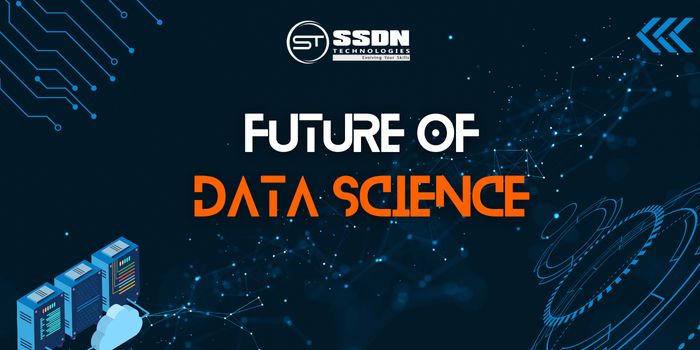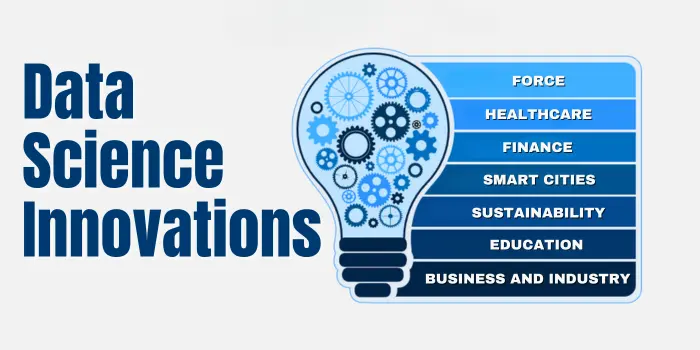
Updated on: June 22, 2024
A vital area at the nexus of statistics, computer science, and domain knowledge, data science is still developing quickly. Knowing the next developments, trends, and possible effects of data science becomes essential as companies and sectors use data to drive choices and innovations.
Artificial Intelligence and Machine Learning
Data science is going to be completely changed in the next years by machine learning (ML) and artificial intelligence (AI). Big data and improved computing powering AI algorithms are automating complicated analytical chores more and more. An area of artificial intelligence called machine learning is concerned with developing algorithms that can learn from and make judgments or predictions based on data. Deeper insights and prediction skills across a range of fields will probably be made possible by the future development of AI and ML approaches.
Big Data
Digital commerce, social media, and the Internet of Things (IoT) are driving the unrelenting exponential expansion of data. Massive data gathering, storage, and analysis are referred to as big data when it is too much for conventional data processing methods. Technologies in storage, real-time analytics, and the incorporation of unstructured data sources including text, photos, and videos are among the Future Big Data developments. Strong frameworks will be required of data scientists in order to effectively extract important insights from these enormous databases.
Data Ethics and Privacy
Data collecting grows, and with it worries about privacy and ethics. Tight laws and moral principles will unavoidably be part of data science in the future to control data use and safeguard individual privacy rights. Building trust and guaranteeing ethical data practices will need innovations in anonymization methods, safe data exchange protocols, and openness in AI algorithms.
Edge computing
Processed close to the source of generation, edge computing does away with the need for centralized data centers. Because of the bandwidth and latency reductions, real-time data processing and decision-making are now possible. Edge computing will be integrated more into the future of Data Science with AI and IoT devices to provide quicker insights and more responsive systems in industries like healthcare, driverless cars, and smart cities.
Automated and Augmented
Automation of data science activities by AI-driven platforms and tools will keep picking up speed. This tendency frees up data scientists to concentrate more on strategic analysis and decision-making than on repetitive data processing chores. By augmenting human talents with AI-driven insights and suggestions, on the other hand, decision-making processes in all sectors become more knowledgeable and efficient.
Collaboration Across Disciplines
Interdisciplinary cooperation is where data science is headed. Data scientists will need to work directly with domain experts, legislators, and ethicists as data gets increasingly ingrained in many facets of business and society to guarantee that data-driven solutions are efficient, moral, and in line with organizational objectives. Through this cooperative strategy, creativity will be encouraged and customized solutions to difficult problems will be possible.
Continuous Learning and Upskilling
Upskilling and ongoing learning are critical in the dynamic area of data science. The requirement for data scientists to be current with the newest tools, methods, and approaches will be emphasized in the future of Data Science course. Professionals will be able to pick up new abilities and adjust to changing market needs thanks in large part to online courses, certifications, and collaboration platforms.
Storytelling and Visualisation
Data scientists will need to communicate data effectively via narrative and visualization more and more in the future. Influencing stakeholders and decision-makers will depend critically on your capacity to condense complicated findings into engaging stories as data quantities increase. Tools and methods for data visualization will advance, enabling data scientists to drive practical insights from data and convey discoveries more successfully.
Natural Language Processing (NLP)
With NLP developments, data scientists will be able to more successfully extract insights from unstructured textual data. This improves the capacity to extract meaning from large volumes of textual data and encompasses sentiment analysis, text summarising, and language translation.
Virtual and augmented reality (VR)
Immersion analytics and data display will be completely changed by AR and VR technology. New methods of data interaction may be offered by these technologies, allowing users to easily traverse data landscapes and see complicated information in three dimensions.
Predictive Analytics
Improvements in predictive analytics will allow businesses to more accurately forecast future trends, actions, and results. This covers sophisticated forecasting models, anomaly detection, and prescriptive analytics that suggest courses of action based on insights from prediction.
Sturdy Data Security
Robust data security measures will be critical given the growing quantity and importance of data. Blockchain technology, secure multi-party computing, and encryption innovations will guarantee the secrecy, integrity, and resistance to cyberattacks of data.
Future Consequences of Data Science Innovations
Big potential exists for data science to fundamentally change society and industry in the future:
Business Transformation: Throughout industries, AI-driven insights and predictive analytics will spur innovation, streamline processes, and develop new business models.
Healthcare Revolution: AI and Big Data will completely transform healthcare administration, illness prediction, and personalized therapy, enhancing patient outcomes and cutting costs.
Improved Customer Experiences: More customized goods, services, and marketing initiatives will result from the personalization driven by AI.
Smart Cities and Sustainability: IoT and data analytics will facilitate sustainable development techniques, effective resource management, and smart urban planning.
Ethical Issues: Addressing issues of privacy, bias reduction, and algorithm openness will be crucial as AI and Big Data spread.
Global Impact: By using data-driven solutions and policy insights, data science breakthroughs can help to address global issues like climate change, public health emergencies, and economic inequality.
As these breakthroughs materialize, data science will keep being essential in determining how technology, decision-making, and global society advancement develop. Organizations and governments hoping to prosper in the data-driven world will need to embrace these trends and use data sensibly.
Impact of Data Science Innovations
Different industries will be greatly impacted by the quick development and uptake of these data science trends and innovations:

Business and Industry: Better predictive analytics and insights powered by AI will streamline processes, raise consumer engagement, and spur creativity in product creation.
Healthcare: With individualized treatment plans, advanced diagnostics, and effective resource management, AI and Big Data will completely transform patient care.
Finance: Stronger fraud detection, risk management, and client-focused financial services will result from advanced data analytics.
Education: AI-powered personalized learning experiences will meet the demands of every student, raise results, and simplify administrative procedures.
Smart Cities: Better citizen services, resource management, and effective urban planning will all be made possible by Internet of Things sensors and data analytics.
Sustainability: Insights from data will propel environmentally friendly, energy-efficient, and agricultural methods.
Summary
Powered by developments in AI, Big Data, ethics, and multidisciplinary cooperation, data science is about to see unheard-of growth and innovation. The future of Data Science is going to transform whole sectors, make decision-making easier, and boost society’s well-being. Harnessing the full power of data ethically will need ongoing learning and adaptation as data scientists negotiate this ever-changing terrain. Adopting strong data security protocols and moral principles will guarantee that inventions fueled by data benefit people and society at large. Organizations may set themselves up to succeed in a data-driven future and successfully tackle global issues by staying ahead of these trends.





